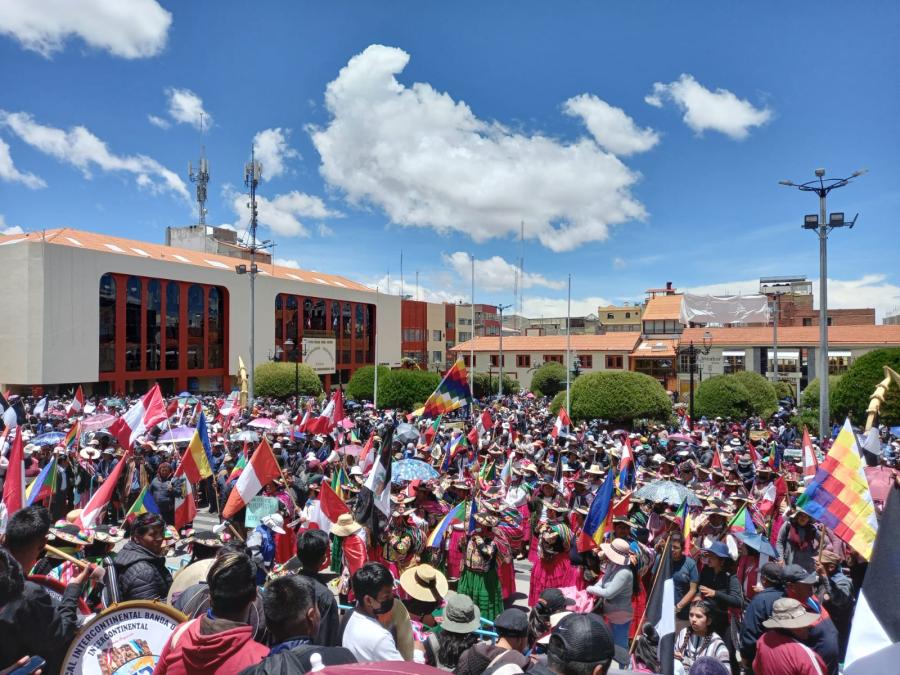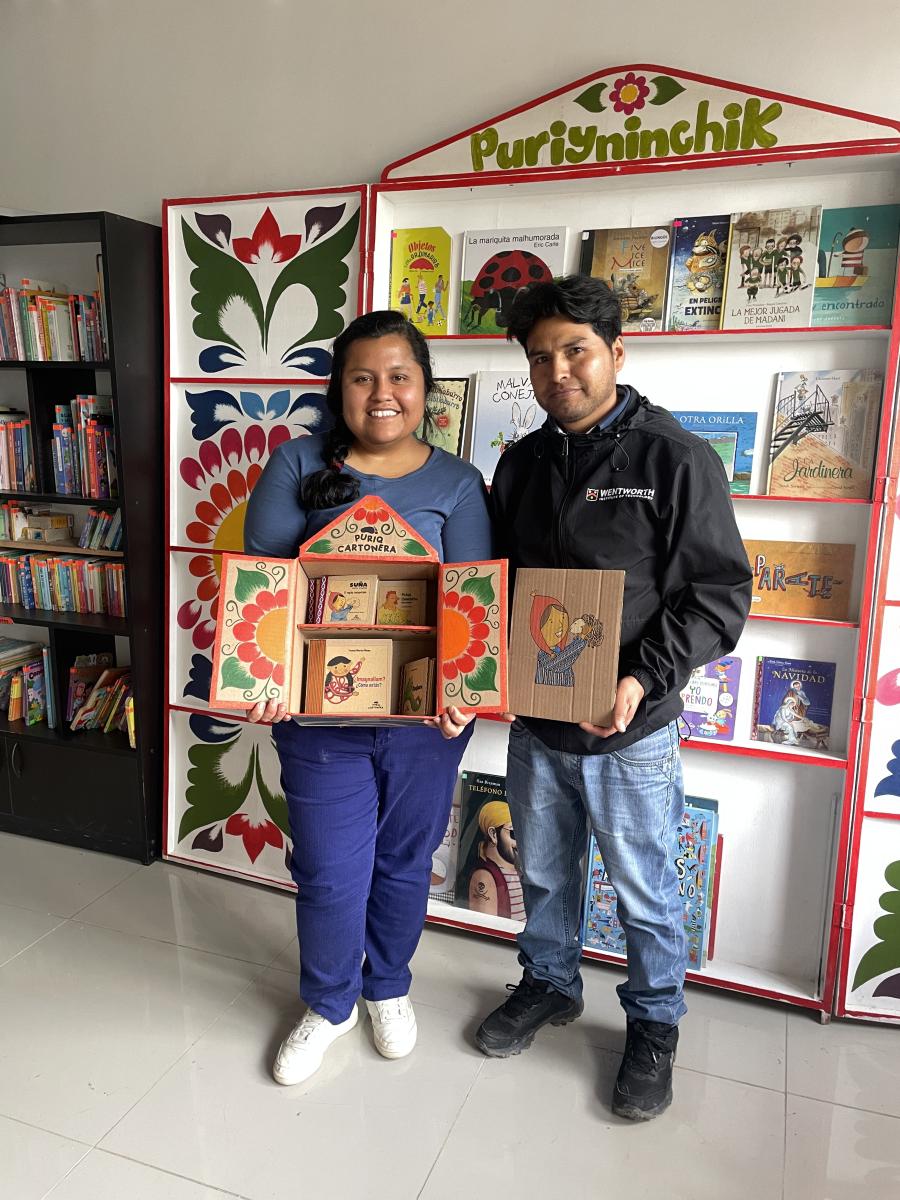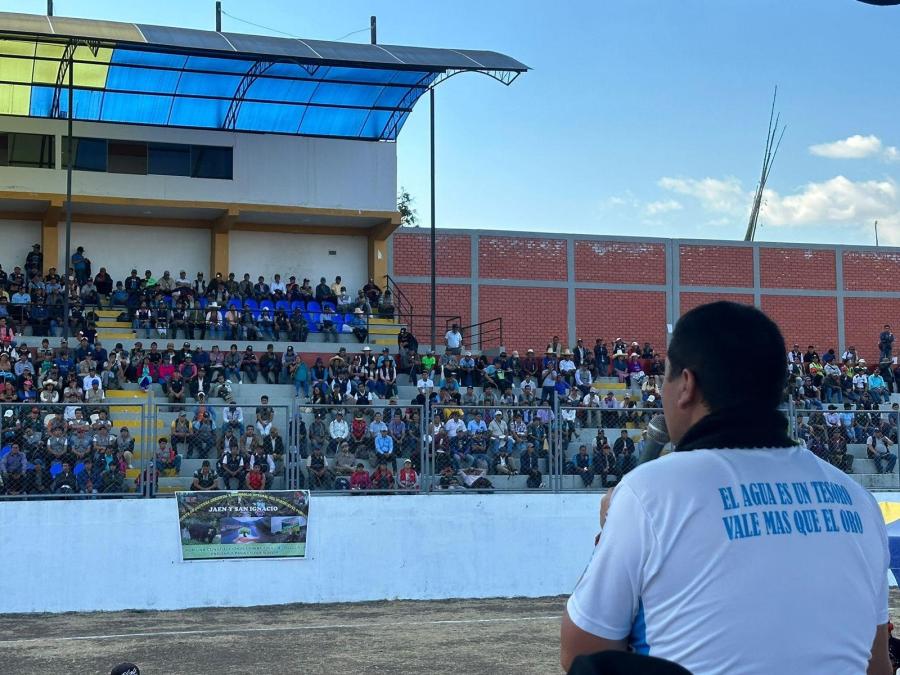Since 1980, over 50 percent of Cultural Survival's limited funds have been designated to support field projects among Indians and similarly disadvantaged ethnic groups in the Third World. New projects are added to Cultural Survival's program each year, and others finish their funding cycle. Two or more projects are described in each issue of the Quarterly. The last issue of each year also includes a brief description of Cultural Survival's project philosophy and project selection process. This is followed by two project descriptions and a summary list of all projects that have received support from Cultural Survival during the past year.
How Are Projects Selected?
Rather than designing projects, Cultural Survival responds to requests from either Indian communities, their regional organizations or Indian support groups. But our budget permits us to support only a few of the requests received. To use our funds most effectively, we select projects that (1) address representative problems faced by small societies in many areas and (2) allow for extensive documentation and analysis.
By confronting common problems we can respond to a few groups' urgent needs and, at the same time, generate case studies useful in developing methodology and theory for aid to other populations.
We send documented results to concerned individuals and institutions and, when appropriate, to national governments. Cultural Survival also provides emergency assistance such as medical supplies and travel funds to support urgent research during periods of extreme violations of human rights.
Cultural Survival's support differs from that of other organizations offering assistance. We cannot, for example, hope to feed the hungry or support community development worldwide; we have neither the financial nor the human resources to attempt this. What we can do is to help indigenous peoples to help themselves in a variety of ways, by supporting their organizations, helping them secure title to their lands and supporting and advising them on questions of resource management and economic development. Above all, we share our knowledge of indigenous efforts to solve similar problems, gleaned from our research and from the results of our own projects elsewhere.
Cultural Survival's field projects develop from a definition in which culture is made up of a set of social mechanisms that gives a society its identity and allows it to comprehend its place in the world and to adapt to changing circumstances. This definition of culture does not imply the preservation of some romantic status quo, but rather supports those mechanisms that permit a group to successfully adapt to change. Cultural Survival takes the position that societies do change and that it is not for outsiders to determine whether indigenous people are being "true to themselves." The organization responds to the needs expressed by native peoples themselves, not to some outsider's idealized image of an appropriate life. These ideas are consistent with the aspirations and demands of native peoples throughout the world. Most want neither their lands nor themselves "frozen" from change and development.
What Is a Representative Problem?
Physical decimation, either from murder, induced famine or introduced diseases, threatens numerous distinct ethnic populations; it sparks justified outrage and demands immediate action in the form of denunciation or international intervention and monitoring. Such gross violations of human rights usually cannot be confronted by field projects. Nevertheless, local development projects serve a vital function by perhaps preventing some atrocities. Genocide or other extreme human rights violations often occur after a long process of gradual social erosion and economic marginalization which weakens a population's ability to defend itself as a group. Terms such as assimilation and integration usually only mask, and thus make more palatable, the destruction of the social fabric that binds a group, provides it with a voice and permits an integrated program for controlling its future.
Cultural Survival's complementary program of field projects and research developed from observations that small societies often become victims during periods of change simply because they are excluded, not because they are incapable of or unwilling to change.
Typical requests for Cultural Survival support fall into two general categories:
1. Specific proposals for assistance to improve the lives of native people. Foremost among these are projects that address the fundamental need for a secure territorial base and sustained use of its natural resources. In addition, requests arise for appropriate education, access to credit, assistance to grassroots indigenous organizations, improved health care and opportunities for locally managed economic activities.
2. General requests to eliminate the abuses ethnic groups face from the dominant national society, such as:
* Political domination
* Violence and other forms of repression
* Absence of equal rights and justice under the law
* Distorted or Eurocentric histories
Cultural Survival's field projects generally assist groups that anticipate or are undergoing radical social change and are often at critical crossroads in their social and economic evolution. Such projects are selected in order to provide groups with as much control as possible over economic and social variables, and thus will permit them-the flexibility and means necessary to prevent their becoming marginalized victims.
Following the selected project descriptions is a complete listing of Cultural Survival's new and continuing projects during 1987. Readers are referred, in some cases, to other project descriptions (or updates) in this or previous issues of the Quarterly. Anyone wishing to receive additional information on any of these projects is welcome to contact Cultural Survival.
Project Evaluations
During 1987, Cultural Survival obtained the services of independent specialists to undertake evaluations of most field projects. This research was undertaken through a broad approach to the term evaluation. Most evaluators normally focus on the utilization of funds provided by the particular donor agency to a group in the field. Such a limited concept of evaluation, however, would not satisfy Cultural Survival's needs nor accurately reflect its aims.
The support provided by Cultural Survival, particularly assistance to regional Indian organizations (ethnic federations), often does not fund entire or discrete "projects." Some support materializes as seed money to a nascent organization; it allows them to acquire experience in organizing and developing programs (agricultural or forestry development, for example) and submit requests for more extensive project aid from more well-endowed agencies or foundations. In other cases. Cultural Survival's contributions support a single segment (such as core support) of a group's overall program.
In each case, however. Cultural Survival's concern is with the entire organization, its program and the projects that program creates. As such. Cultural Survival's "evaluations" are better understood as case studies which illustrate examples and patterns of self-directed development. An evaluation solely of Cultural Survival's economic contribution would provide only a partial view of a larger "project." As such, the evaluations focus on the broader problems and activities of the institutions and organizations we support.
Also, to provide opportunities for comparisons and recommendations, Cultural Survival's evaluations/case studies were grouped according to themes, which illustrate how indigenous peoples and others have confronted the unique problems faced by Indians. These topics are:
* Indian organizations
* Resource management
* Land titling
* Legal assistance
* Education
* Art, artisan work and culture centers
This grouping permits a set of detailed reports which will discuss and analyze the topics in terms of a broad range of activities and problems relating to Indian human rights and their relationship to national development. The discussion and analysis presented in these reports enables them to offer suggestions for future work as well.
To date no such collection of constructive analyses exists. These studies will be organized and edited into a series of monographs to be published by Cultural Survival, to provide case studies, basic guidelines and analyses for future support of indigenous human rights and development needs.
Peru
AIDESEP - The Inter-Ethnic Development Association of the Peruvian Jungle
Assistance in strengthening ethnic federations of indigenous peoples is a priority of Cultural Survival's program. Strong ethnic federations are perhaps the best mechanism for indigenous societies to create a unified voice with which to demand their rights before national and international agencies which could easily overwhelm a single community or an isolated tribal group. In addition, pan-community organizations are an effective means for Indians to address and resolve local social and economic matters. They also serve to reinforce cultural pride and identity.
AIDESEP is one such ethnic federation. It was formed in 1980 as a private, nonprofit Indian organization to organize and unify the approximately 220,000 tropical forest-dwelling Indians of Peru's eastern lowlands. To date, AIDESEP has incorporated and represents over 15 ethnic groups: the Aguaruna-Huambisa (three groups), Shipibo-Conibo, Cocama, Asháninka-Campa (three groups), Quichua, Huitoto, Bora, Ocaina, Chayahuita, Achuar, Piro and FENAMAD (Efejja, Machiguenga). At AIDESEP's Twelfth Annual Congress in 1987, 15 member groups attended as well as delegates of two other unaffiliated groups. The organization is now working to organize and incorporate other groups. As such, AIDESEP now works on behalf of about 60 percent of Peru's Amazonian Indians.
One of AIDESEP's problems, like all such ethnic federations with limited human and financial resources, is to maintain a strong presence at both a national level and in communities that are often very isolated and difficult to reach.
AIDESEP's current directorate includes Evaristo Nugkuag, president (Aguaruna); Oscar Manihuari, vice president (Cocama); Miqueas Mishari, treasurer (Campa); and Angel Soria, secretary (Shipibo). The directors are responsible for overseeing the projects that have been approved at the Ordinary Assemblies of the base communities. In addition, there are three representatives for each base organization. They maintain regular contact with the directorate and relay decisions, problems and general information from the community level.
To improve its work, AIDESEP has organized itself internally into four departments: (1) Department of Contracts and Projects, (2) Department of Legal Affairs, (3) Department of Scholarships and (4) Publications Department. The department of contracts and projects serves as the organization's link with official Peruvian agencies and institutions, especially the Ministry of Education and the national universities. This department establishes and maintains formal contacts with universities to enable Indian students (and uncertified Indian teachers) to continue their education. Recently, AIDESEP has been meeting with the Center for Anthropological Research of the Peruvian Amazon (CIAAP) to develop an appropriate curriculum for training teachers for programs of bilingual/bicultural education.
The Department of Legal Affairs supports AIDESEP's member organizations directly by helping them obtain legal organizational status (personeria juridica), by representing them before government agencies and in the courts and by keeping abreast of the current progress of Indian land titling being undertaken by the Ministry of Agriculture. It has also provided technical assistance to some organizations or communities. For example, ORACH (Organizacion Achuar Chayat), a recently formed Achuar organization and one of AIDESEP's newest members, receives training from AIDESEP to allow them to carry out a land demarcation effort.
As part of its legal defense work, AIDESEP provides legal advice and advocacy regarding the land and resource rights of member groups. AIDESEP has also handled individual cases. For example, it obtained pardons for Aguaruna and Huambisa leaders who were imprisoned following a land invasion incident by mestizo colonists on the Santiago River. Another case resulted in the release of four Amuesha Indians falsely accused of involvement in drug trafficking.
The scholarships department supports Indian students who are selected by their respective federations. By 1986, AIDESEP awarded scholarships to over 35 students from different ethnic groups. These students are seen as an important future resource, helping support efforts for self-determination and economic development of their peoples.
For some years, the publications department has produced the newsletter Voz Indigena as a means of maintaining contact and exchanging news among the numerous Amazonian Indian groups. The newsletter is the mouthpiece of the member groups through which they share news of the progress of their various projects. Periodically, affiliate organizations send representatives to AIDESEP's office in Lima to learn skills in journalism or photography from the Voz Indigena staff.
AIDESEP has published several monographs. They recently translated and published Cultural Survival's Occasional Paper #8, The Dialectics of Domination in Peru: Native Communities and the Myth of the Vast Amazonian Emptiness, by Richard C. Smith, and the Spanish publication of David Stoll's book Fishers of Men or Founders of Empire?, which examines the nature and activities of the Summer Institute of Linguistics in Latin America. (Both of these books are available in English and Spanish from Cultural Survival.)
AIDESEP has been extremely successful in developing a program of activities to train, incorporate and represent Amazonian Indian communities and regional ethnic organizations. It provides legal defense and legal advice, supports education of their youth, publishes various journals and books and represents member organizations to government institutions. Most important, in carrying out this work, the leadership of AIDESEP has managed to remain true to its original goals: it has maintained an organization that is truly representative of the expressed needs and wishes of its constituent local-level groups. In recognition of the organization's achievements, AIDESEP (together with the Aguaruna-Huambisa and the Coordinadora Amazonica [Amazonian Coordinating Group]) was awarded the prestigious Swedish Right Livelihood Award (commonly known as the Progressive Alternative Nobel Prize) in the fall of 1986. This award, in the words of the Swedish Right Livelihood Society, was founded in 1980 to "honour and support those working on practical and exemplary solutions to the real problems facing us today in the world." AIDESEPs president, Evaristo Nugkuag, traveled to Stockholm accompanied by Jose Narciso Jamijoy (Secretary of ONIC-the National Indian Organization of Colombia); and Jose Uranavi (President of CIDOB, the Indian Federation of Eastern Bolivia) to receive the award on behalf of these organizations. Afterwards, he met with the president of the World Bank to discuss the needs and rights of Indians in the face of large-scale international development. Then he returned to Peru's lower Maranon River to monitor AIDESEP's work there - Indian leaders can't spend too much time away from their roots.
Article copyright Cultural Survival, Inc.



